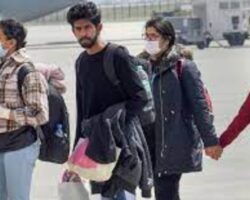Ukraine returnees aren’t welcome at Indian colleges, Centre informs Supreme Court

The Indian Medical Council Act of 1956 and the National Medical Commission Act of 2019 do not have any provisions that permit such transfers, according to an affidavit from the Union health ministry.
The Union government informed the Supreme Court on Thursday that undergraduate medical students evacuated from the war-torn Ukraine cannot be accommodated in Indian colleges because there is no regulation allowing such transfers. Additionally, these transfers would be unfair to local candidates who could not get into these colleges due to low scores.
The Union Health Ministry stated in its affidavit that neither the 1956 Indian Medical Council Act nor the 2019 National Medical Commission Act have any clauses that permit such transfers. The affidavit was presented before the justices Hemant Gupta and Sudhanshu Dhulia.
The affidavit, which was filed in response to a number of petitions by undergraduate medical students who returned from Ukraine as a result of Russia’s invasion of the European country, seeking accommodations in Indian colleges and universities to finish their education, stated that “till now, no permission has been given by NMC (National Medical Commission) to transfer or accommodate any foreign medical students in any Indian medical institute/university.”
The government also clarified that “academic mobility programme”, as approved by NMC through its September 6 circular, does not include Indian universities and is limited to allowing the students from war-torn Ukraine to complete their education in other countries.
“In the Public Notice dated September 6, 2022, the phrase ‘global mobility’ cannot be interpreted to mean accommodation of these students in Indian colleges/universities, as the extant regulations in India do not permit migration of students from foreign universities to India. The aforesaid Public Notice cannot be used as a back door entry into Indian colleges/universities offering UG (undergraduate) courses,” stated the affidavit.
On the aspect of equity, the Centre submitted that most of the students before the court went to Ukraine either due to poor scores in the National Eligibility Entrance Test (NEET) Exam or because of less expensive medical education in Ukraine.
“It is humbly submitted that in case these students with poor merit are allowed admission in premier medical colleges in India, by default, there may be several litigations from those desirous candidates who could not get seats in these colleges and have taken admission in either lesser-known colleges or have been deprived of a seat in medical colleges. Further, in case of affordability, if these candidates are allocated private medical colleges in India, they once again may not be able to afford the fees structure of the concerned institution,” it added.
The affidavit emphasised that the government and NMC have already taken appropriate steps by allowing academic mobility programme and also letting medical students from Ukraine and China, who had completed their course before June 30, 2022, but were unable to complete their internship, to appear in the Foreign Medical Graduate Exam (FMGE), which is a screening test that foreign medical students have to clear to practice in India.
“Any further relaxation in the regard, including the prayer seeking transfer of these returnee students to medical colleges in India would not only be dehors the provisions of Indian Medical Council Act, 1956 and the National Medical Commission Act, 2019 as well as the regulations made thereunder, but would also seriously hamper the standards of medical education in the country,” said the Centre.
The top court will take up the clutch of petitions, filed through advocate Vineet Bhagat, Ashwarya Sinha and Prashant Padmanabhan, among others, on Friday.
On August 26, the Supreme Court bench sought the Centre’s stand on the issue, referring to a report prepared by the Parliamentary Committee on External Affairs. This report, submitted to Parliament on August 3, recommended that Indian students, who had returned from Ukraine following the ongoing war with Russia, should be allowed to complete their medical courses in the country.
On that day, senior advocate R Basant, appearing for one of the petitioners, claimed that in all, 20,000 students were affected.

